Affiliate links on Android Authority may earn us a commission. Learn more.
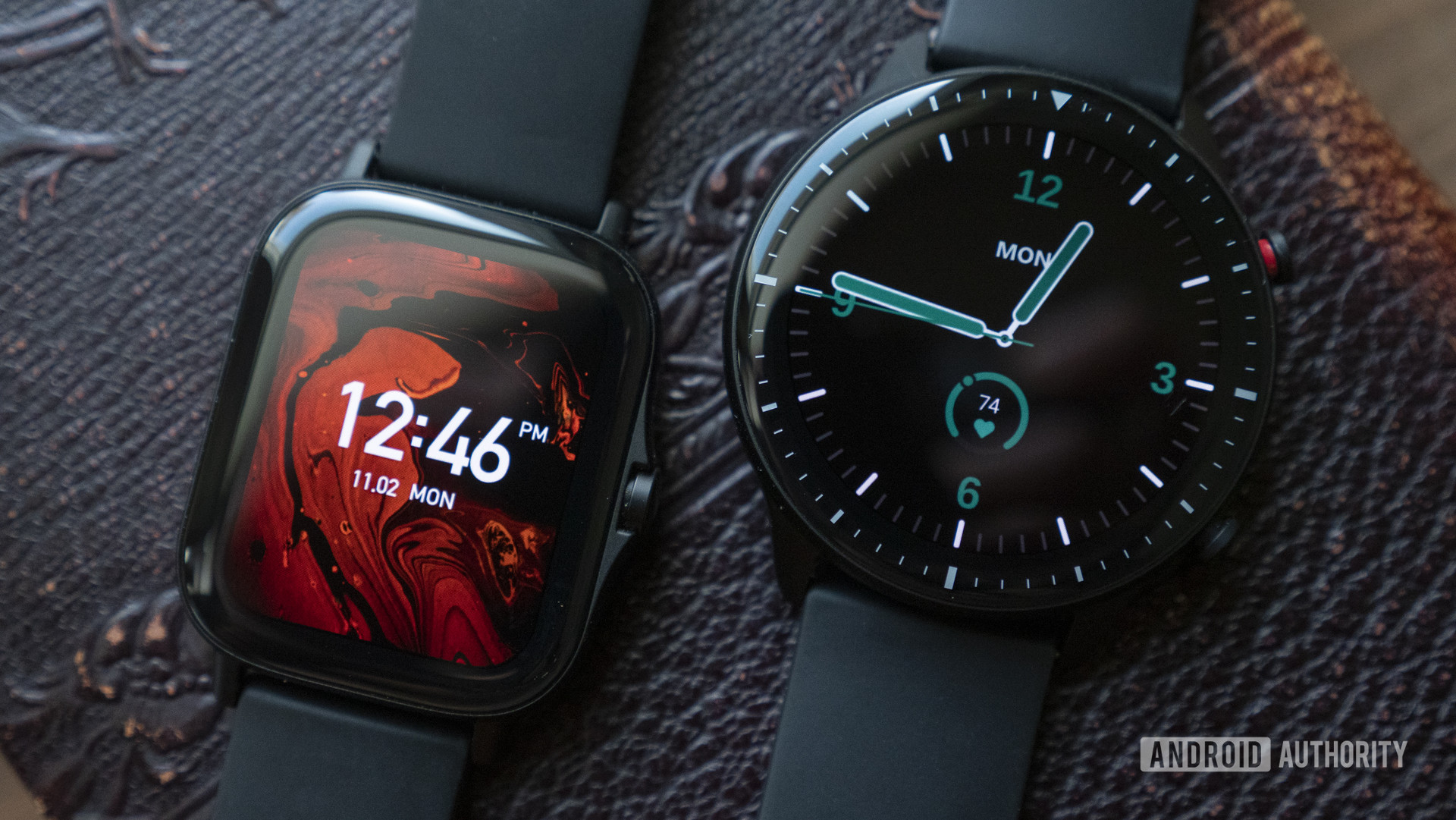
Huami Amazfit GTS 2 and GTR 2
What we like
What we don't like
Huami Amazfit GTS 2 and GTR 2
Huami makes feature-packed smartwatches that normally don’t break the bank. Perhaps that’s why last year’s Amazfit GTS and Amazfit GTR smartwatches were so popular. Yet, after only a year on the market, the GTS and GTR are growing a little long in the tooth. They’re still decent watches, but competing products in 2020 have more health sensors (for better or worse) and more smart capabilities.
Huami hopes to keep up with the competition with two new entries in the affordable wearable space. Read our full Amazfit GTS 2 and GTR 2 review to see if either of these smartwatches is right for you.
Update: April 2021: We have updated our Amazfit GTS 2 and GTR 2 review with details on recent software updates and price drops.
Amazfit GTS 2 and GTR 2: What’s new?
The Amazfit GTS 2 and GTR 2 are improvements over their predecessors, but neither device introduces any drastic changes. Here’s what’s new/different over last year’s models:
- SpO2 sensor: New this year is an SpO2 monitor on both models. SpO2 sensors (or pulse oximeters) measure your blood oxygen levels, which has been an increasingly popular health metric in 2020.
- BioTracker 2 sensor: Huami’s new BioTracker 2 optical sensor now delivers all-day heart rate monitoring and real-time heart rate readings during exercise.
- Built-in Amazon Alexa for global variants: While the feature was omitted at launch, the Amazfit GTS 2 and GTR 2 now both have Amazon Alexa onboard.
- Bluetooth phone calls: Both watches have a speaker and microphone. As long as your watch is connected to your phone via Bluetooth, you can answer calls on it.
- Onboard storage for music: Each watch has around 3GB of onboard music storage, which is enough room for 300-600 songs depending on size.
- PAI score: Like a few other devices in this category, the Amazfit GTS 2 and GTR 2 add PAI metrics, or Personal Activity Intelligence. This feature was added to the GTS and GTR in November 2019. You can read all about this in our Xiaomi Mi Band 6 review.
- Stress detection: The GTS 2 and GTR 2 track your stress levels throughout the day.
- Improved sleep monitoring: Both new watches can now track your sleep stages (light, deep, REM), monitor your breathing conditions overnight, and track naps between 11AM and 6PM.
Those were all the new features. Let’s go through the things Huami carried over from the original GTS and GTR:
- 90 built-in sports modes including outdoor running, walking, outdoor/indoor cycling, treadmill, open water/pool swimming, elliptical, climbing, trail running, skiing, free training, and more
- Update: In December 2020, Huami rolled out an update to the watches that increased the number of sport profiles from 12 to 90. This update also added automatic workout detection.
- 24/7 heart rate tracking
- GPS + GLONASS
- 5ATM water-resistance rating
- Tracks steps, distance, and caloric burn
Finally, these are two very similar smartwatches, but there are a few differences between them.
- Overall design: The Amazfit GTR 2 is more of a traditional watch design, with a round face and time etchings around the bezel. The Amazfit GTS 2 has a typical budget-friendly smartwatch design, with its rounded-rectangular display and narrow case.
- Colors: The GTS 2 only comes in one model and three color options. The GTR 2 sport edition comes in just one color option, but there’s also a classic version made of more premium materials.
- Display sizes and resolutions: The GTR 2 is the bigger watch despite its screen diagonal being technically smaller. The GTR 2 has a 1.39-inch circular AMOLED panel with a 454 x 454 resolution, while the GTS 2 has a 1.65-inch rectangular display with a resolution of 348 x 442.
- Physical buttons: The GTR 2 has two physical buttons. The top opens your apps screen, while the bottom acts as a workout shortcut. The GTS 2 only has one button that opens your apps page. None of the buttons rotate for easier device navigation.
- Battery life: The GTR 2 is bigger, so it’s going to have a longer-lasting battery. The GTR 2 can last ~14 days with normal use, ~38 days with basic use, and ~48 hours with continuous GPS use. This is down from the GTR’s ~24-day battery life with normal use. The GTS 2 lasts ~7 days with normal use, ~20 days with basic use, and ~25 hours with continuous GPS use. This is down from the GTS’ ~14-day battery life with normal use.
Amazfit GTS 2 and GTR 2 specs
| Amazfit GTS 2 | Amazfit GTR 2 | |
|---|---|---|
Display | Amazfit GTS 2 1.65-inch AMOLED 348 x 442 resolution 341ppi 450 nits | Amazfit GTR 2 1.39-inch AMOLED 454 x 454 resolution 326ppi 450 nits |
Dimensions and weight | Amazfit GTS 2 42.8 x 35.6 x 9.7mm 24.7g (without strap) 20mm strap | Amazfit GTR 2 46.4 x 46.4 x 10.7mm Sport model: 31.5g (without strap) Classic model: 39g (without strap) 22mm strap |
Materials | Amazfit GTS 2 Case: Aluminum alloy and plastic Strap: Silicone | Amazfit GTR 2 Case: Sport model: Aluminum alloy Classic model: Stainless steel Strap: Silicon or leather |
Colors | Amazfit GTS 2 Midnight Black, Urban Grey, Desert Gold | Amazfit GTR 2 Obsidian Black |
IP rating | Amazfit GTS 2 5ATM | Amazfit GTR 2 5ATM |
Storage | Amazfit GTS 2 ~3GB | Amazfit GTR 2 ~3GB |
Battery | Amazfit GTS 2 246mAh Magnetic charger ~2-hour charging time Typical battery life: ~7 days Basic use battery life: ~20 days GPS use: 25 hours | Amazfit GTR 2 471mAh Magnetic charger ~2.5-hour charging time Typical battery life: ~14 days Basic use battery life: ~38 days GPS use: 48 hours |
Sensors | Amazfit GTS 2 BioTracker 2 PPG biological data sensor Air pressure sensor Accelerometer Gyroscope Geomagnetic Ambient light | Amazfit GTR 2 BioTracker 2 PPG biological data sensor Air pressure sensor Accelerometer Gyroscope Geomagnetic Ambient light |
Connectivity | Amazfit GTS 2 Bluetooth 5.0 WLAN 2.4GHz | Amazfit GTR 2 Bluetooth 5.0 WLAN 2.4GHz |
Compatibility | Amazfit GTS 2 Android 5.0 and above iOS 10.0 and above | Amazfit GTR 2 Android 5.0 and above iOS 10.0 and above |
What I like about the Amazfit GTS 2 and GTR 2
These are both second-generation devices, so it’s no surprise to see Huami get many things right with the Amazfit GTS 2 and GTR 2. Here’s what I liked most about the smartwatches.
The displays
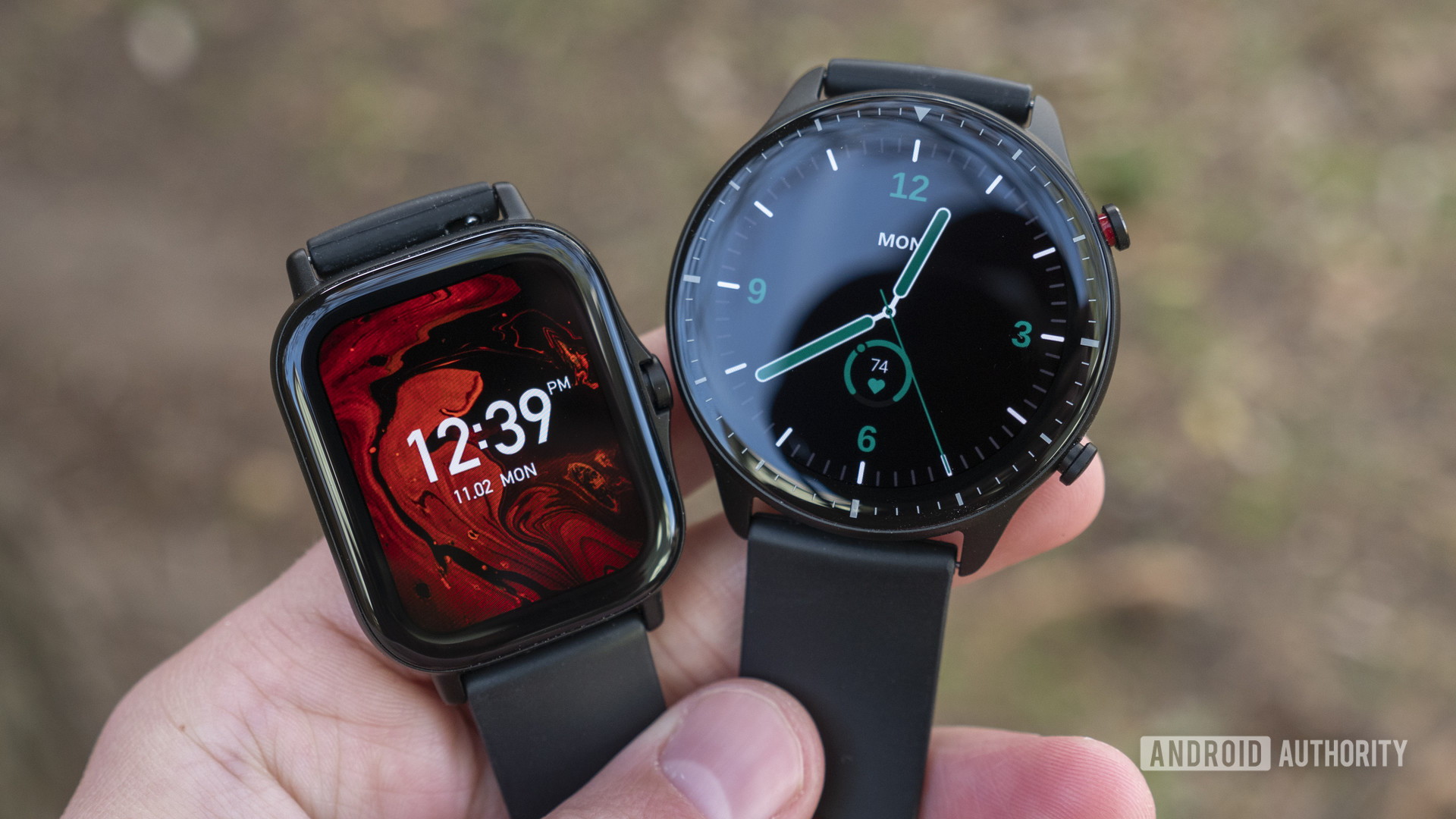
The displays on both watches are fantastic. Both are AMOLED panels that get plenty bright in direct sunlight outdoors and dim enough for nighttime use.
There’s an always-on display option, too. Since Huami makes all its own watch faces, most of those available in the Zepp app translate well to the always-on display. You can schedule the AOD to turn on/off depending on the time of day, so you don’t need to worry about it using precious battery life while you’re sleeping. You can also enable/disable lift-to-wake functionality based on the time of day.
Amazfit GTR 2 design
The Amazfit GTR 2 is definitely my favorite. The big, round display and classic design make the GTR 2 the more approachable of the two watches. The design reminds me of the Galaxy Watch Active 2 and HUAWEI Watch GT 2 Pro.
Despite its thin and lightweight build, this is a pretty big watch. I think the 1.39-inch display looks fine on my wrist, but those with smaller wrists might want to opt for the narrower GTS 2.
Offline voice control
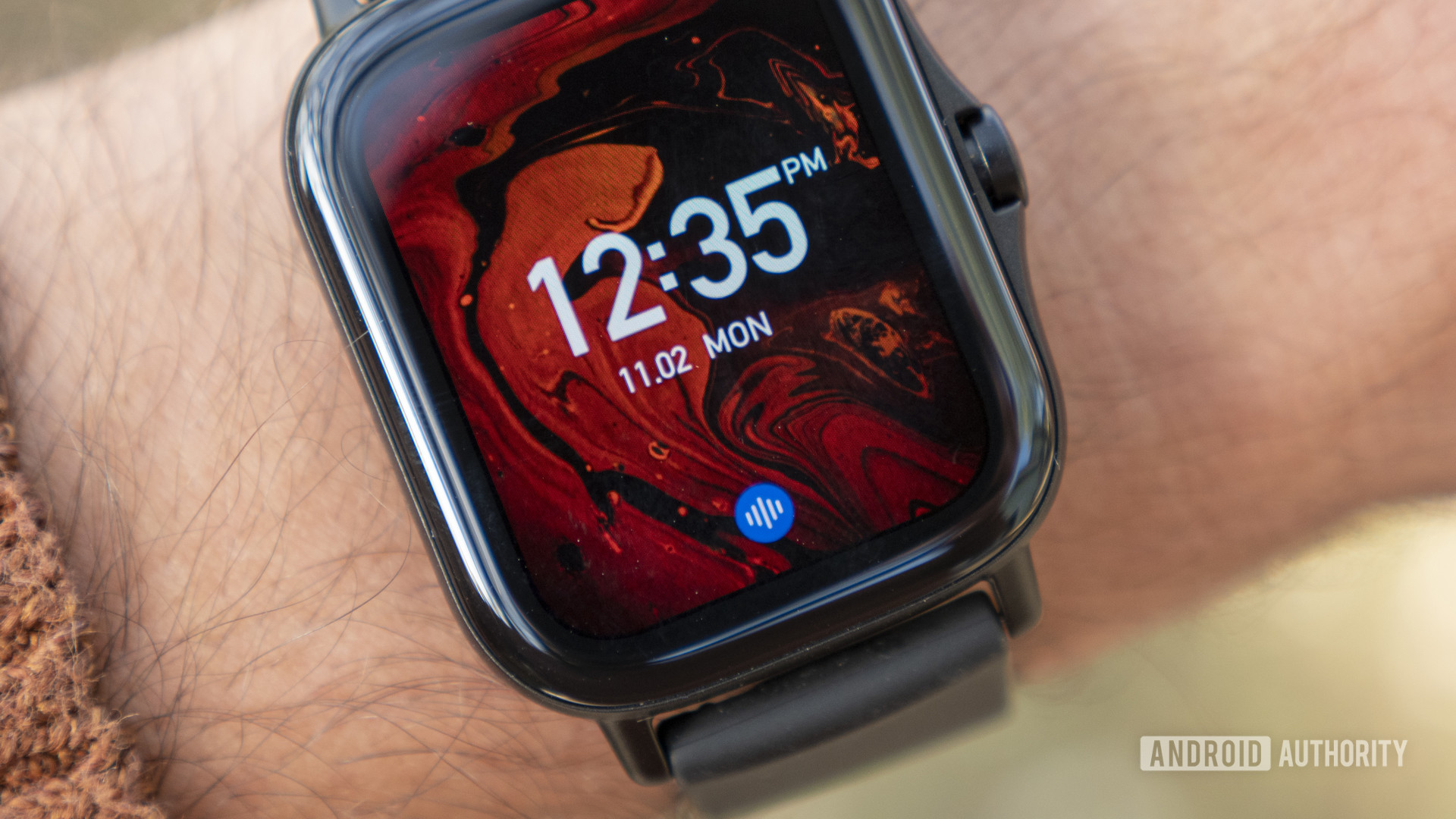
The two Amazfit watches come with an offline voice control feature, which I’m surprised isn’t on every smartwatch ever. Instead of relying on an internet-connected voice assistant like Alexa (we’ll get to that later), you can set the offline voice assistant to automatically listen to your queries after turning your wrist or after the screen light turns on. When the little purple icon shows up, you can ask your watch to perform offline requests. No wake word required.
You can ask it things like “Open weather,” “Start outdoor running,” or “Brightness up/down.” The watches then perform those requests without skipping a beat. It’s quite handy when you’re in a pinch and don’t want to scroll throw a bunch of little smartwatch settings pages to find what you’re looking for.
Forget Alexa, Huami's offline voice assistant is the most convenient smartwatch feature.
Built-in speaker
The built-in speaker on both models is surprisingly good. Listening to a few songs on the watch itself was actually a pleasant experience too.
Battery life
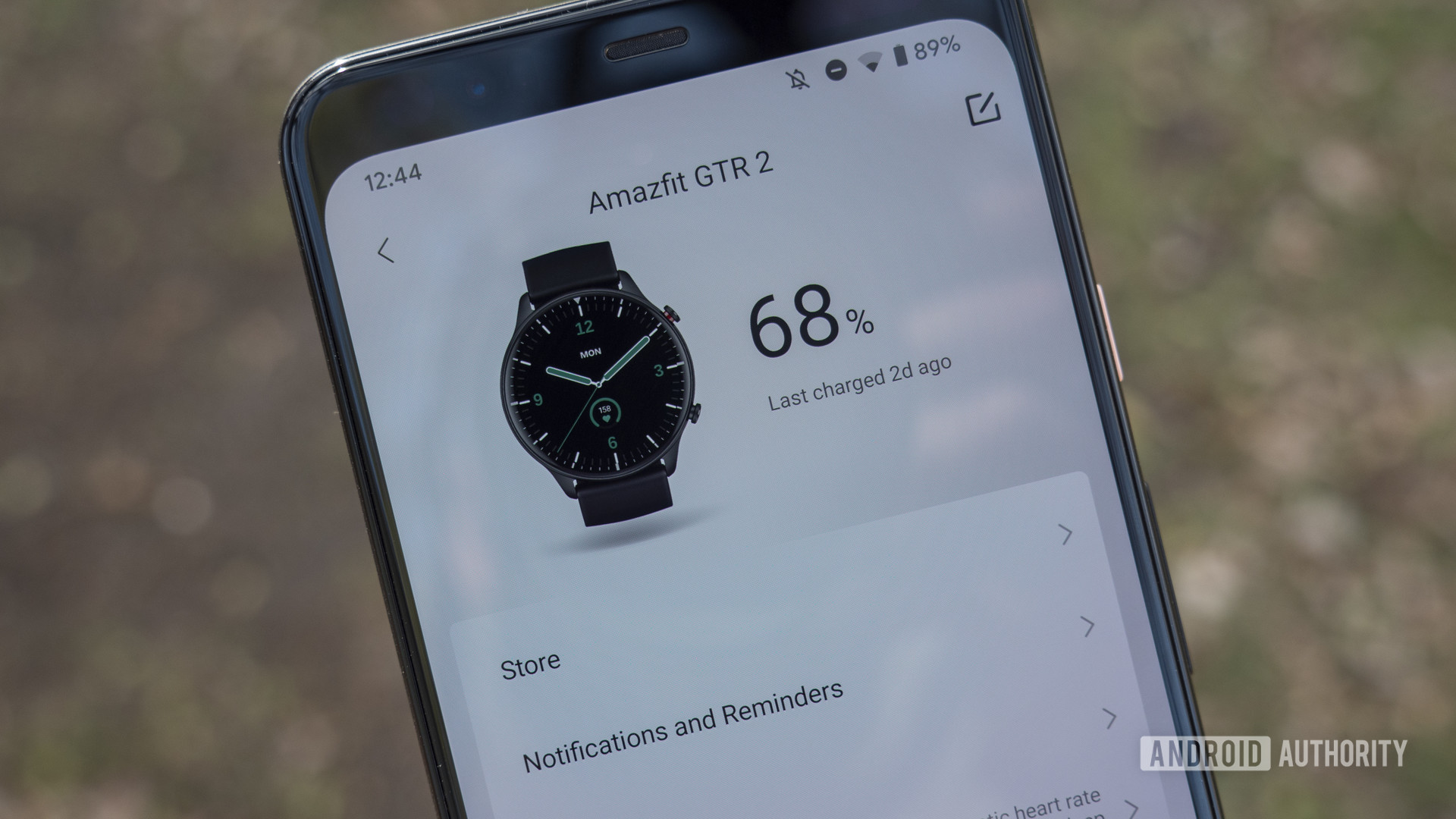
As mentioned, the GTS 2 should last around seven days on a single charge, while the GTR 2 should last around two weeks. Based on my usage habits over the last week, I believe Huami’s claims are accurate. I’ve worn both for all-day heart rate tracking, working out a few times a week, and during sleep. The GTS 2 lasted me about 6.5 days, and the GTR 2 is on track to last me about 12 days.
The always-on display will reduce the battery life quite a bit, however. You can also limit all-day heart rate monitoring if you’d like to save some juice.
Sleep tracking
Basic sleep tracking has been accurate and reliable with both devices. The GTS 2 and GTR 2 can track sleep stages (light, deep, and REM) and display the information clearly in the Zepp app. I like that the app also lets you record a few pre- and post-sleep conditions to help you track what might be causing your sleep quality to fluctuate.
Related: The best sleep trackers you can buy
I’m not completely sold on Huami’s sleep breathing quality feature for sleep tracking. I’ve never experienced less than 100% perfect breathing during sleep, according to the watches. I mean, I think I’m pretty good in that area, but a consistently perfect score definitely raises some red flags. To Huami’s credit, sleep breathing quality is listed as “beta” in the app.
What I don’t like about the Amazfit GTS 2 and GTR 2
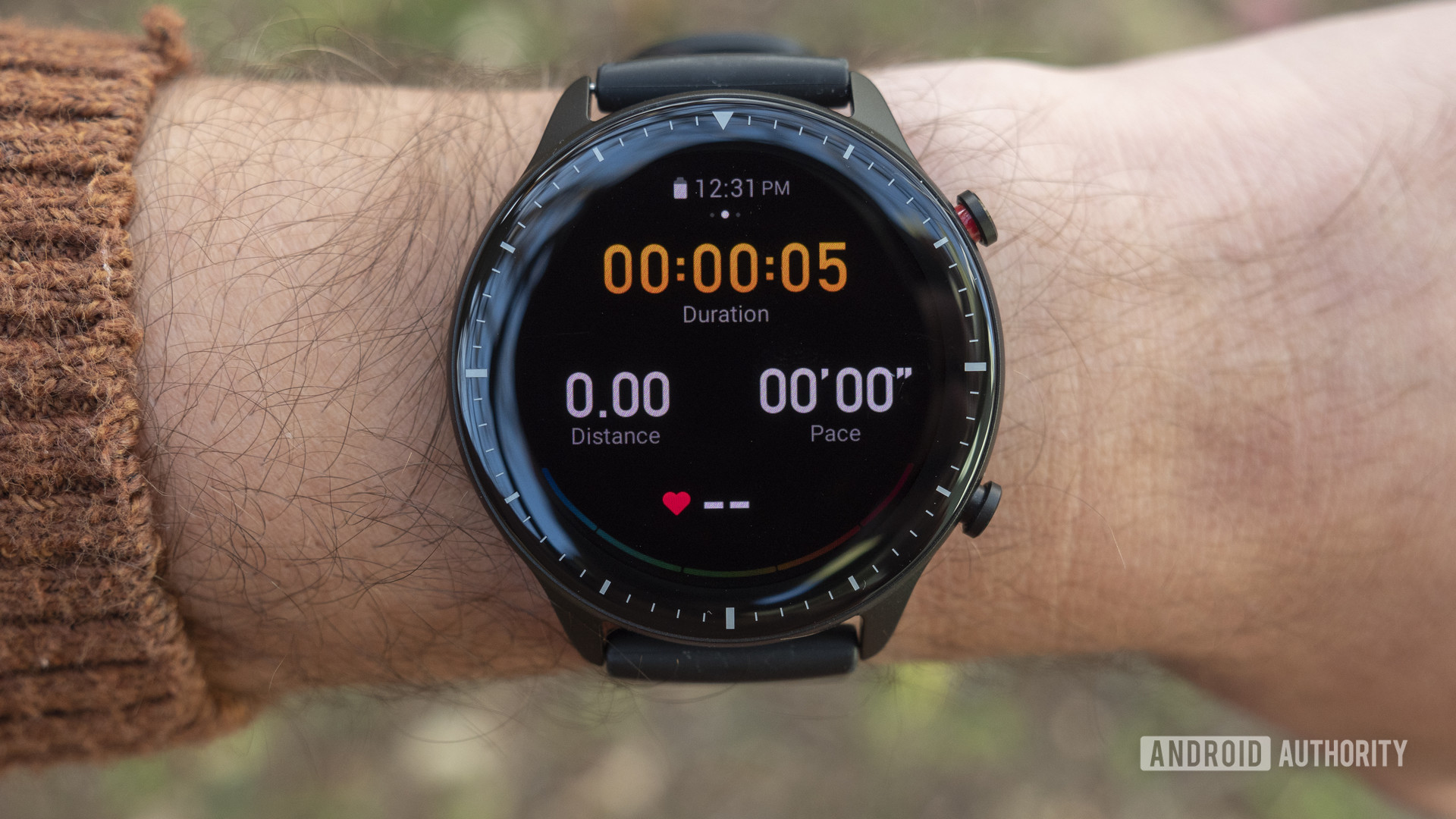
For as much as I like about Huami’s new Amazfit watches, there’s plenty that could be improved.
Amazon Alexa support unavailable at launch
Huami is advertising built-in Amazon Alexa support on the non-Chinese variants of the Amazfit GTS 2 and GTR 2. Unfortunately, it’s not available yet despite the watches being on sale, so I couldn’t try it out. When your device gets the OTA to enable Alexa, you’ll be able to control your smart home devices, ask about the weather, and more.
Alexa support will roll out to GTS 2 and GTR 2 watches in the US, the UK, the Republic of Ireland, Canada, Germany, Austria, India, Japan, Australia, New Zealand, France, Italy, Spain, Mexico, and Brazil at a later date. All Huami will say right now is that the update will roll out “in the near future.”
Don’t miss: Our guide to everything Amazon Alexa can do
No third-party apps or watch faces
When it comes to smartwatch apps, what you see is what you get. The watches come with a basic weather app, alarm, timer, events app, countdown app, and a “find my phone” feature. That’s it. There’s no Spotify, no Strava, no Google Fit. You can connect the Zepp app to a few services for automatic data uploads, but there are no third-party smartwatch apps.
Watch faces are a similar case. Eight come pre-installed on each watch, and more can be found in the Zepp app’s watch face store. I counted 47 watch faces for the GTR 2 and 52 for the GTS 2. On the plus side, many of the available watch faces are customizable.
Notifications
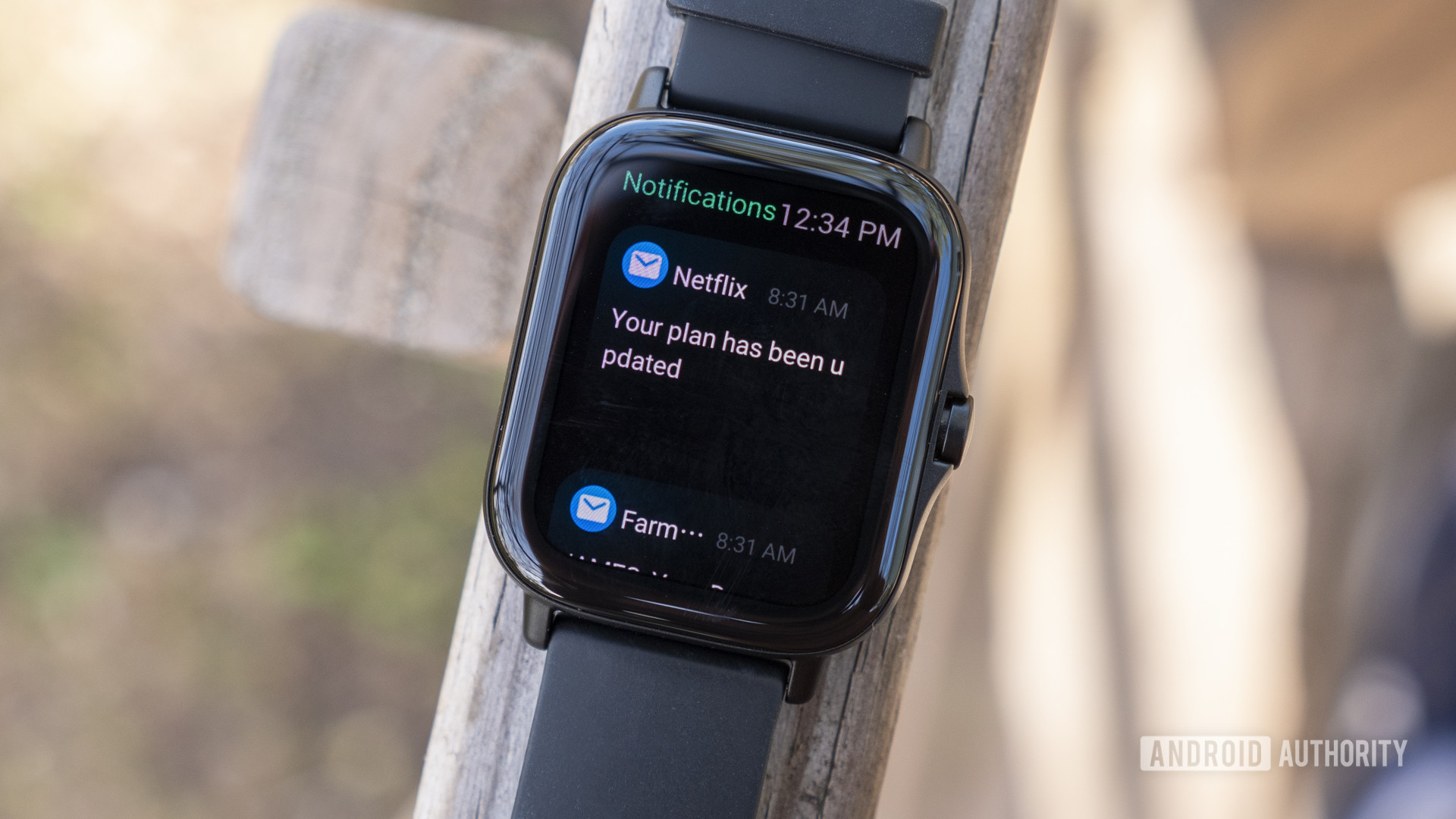
While smartphone notifications have been reliable during my testing, they’re not all that useful beyond a glance. Just about all notifications are as basic as they come. You can’t reply to any messages, and dismissing them on your watch doesn’t remove them on your phone. You can’t expand things like emails either, so you can only see the subject most of the time. Not very helpful.
Amazfit GTS 2 design
I admit I have little tolerance for companies that rip off other brands, especially when it comes to design. The Amazfit GTS 2 looks like a cheap Apple Watch, but not in the still-pretty-high-end Apple Watch SE kind of way.
Certain elements of the Amazfit GTS 2 are good. The display is nice, and it’s lightweight and comfortable. However, the watchOS-adjacent watch faces, the un-rotatable pusher on the right side, and plasticky lookalike design scream bargain bin Apple.
The Zepp app could be improved
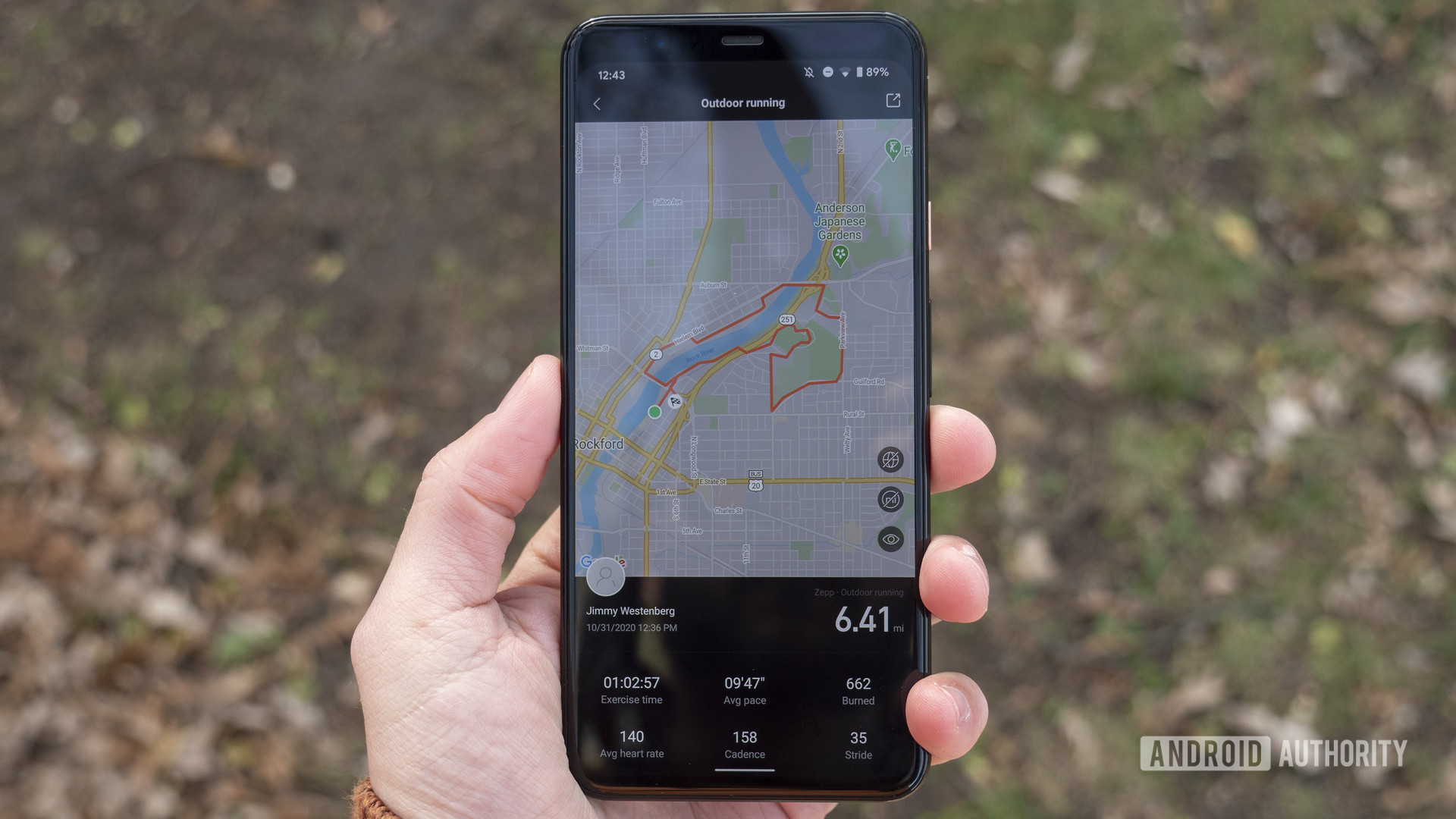
The Amazfit GTS 2 and GTR 2 connect with the Zepp app, which is basically a newly rebranded Amazfit app. I like the overall look, and the homepage is attractive and easy to use. I also like the app’s “all data” list that makes finding individual metrics easier.
However, the application is quite clunky. There are lots of translation issues scattered throughout. I also haven’t found a way to easily see your previous day’s stats without going through every individual metric. This is especially annoying for trying to track down automatically recorded activities. I took a 30-minute walk one night and wanted to check it out the next day. The only remanent I could find of that activity was in the “calories” data screen. Even after I found my walk, I couldn’t click on it to view the stats.
Though, I’m happy to report that I didn’t run into any of the onboarding issues C Scott did during his Zepp E Circle review.
My suggestion for Huami? Get rid of the “Enjoy” page, which seems to be an overflow for alarms and app alert settings. All of that can be neatly packed into the Profile page, where all of those settings exist anyway. That would leave more than enough room to add in a workout calendar or something to make the user experience a little smoother.
SpO2 sensor
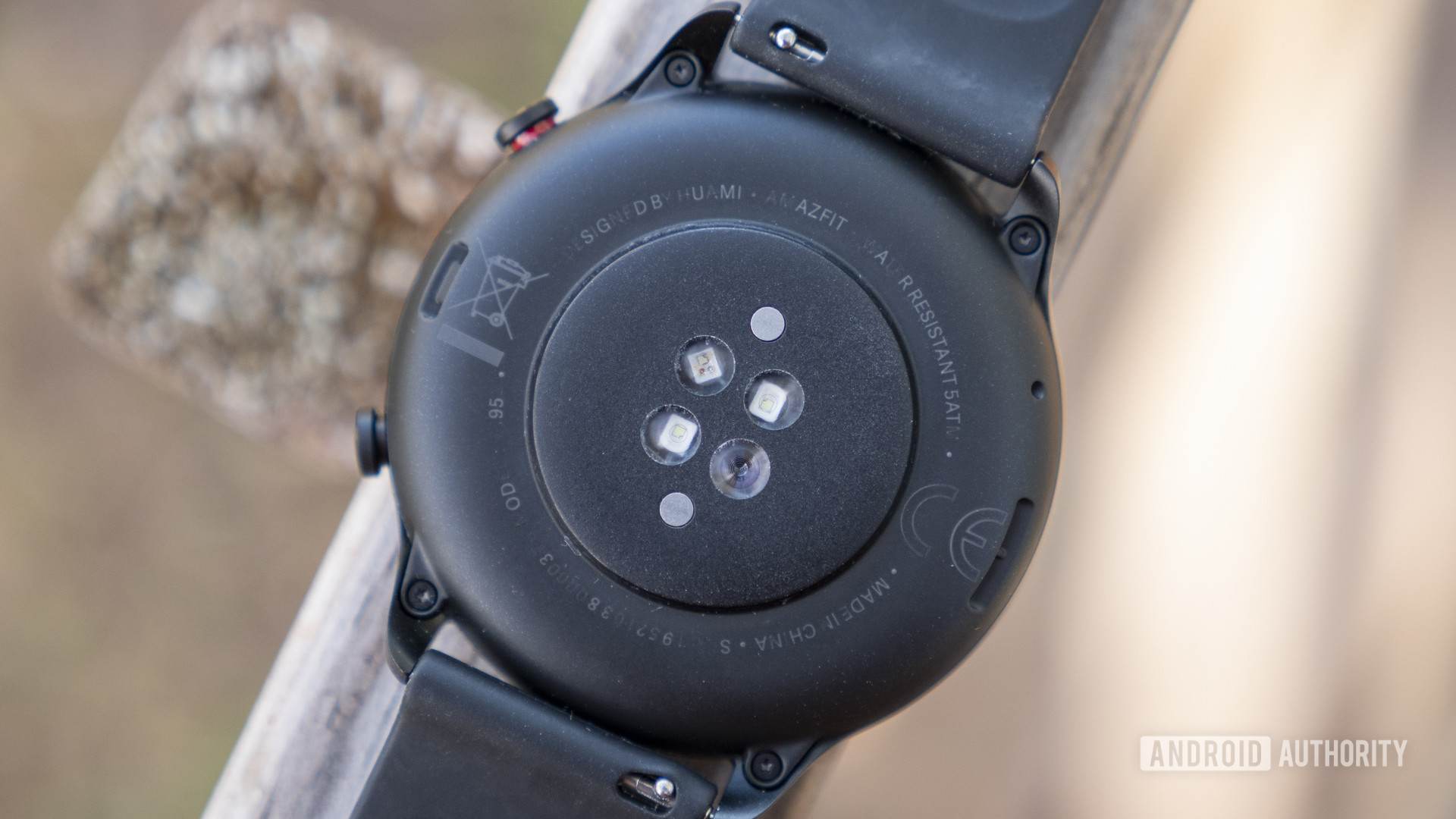
SpO2/blood oxygen sensors are all the rage in 2021, but they’re not all created equally. Some companies, such as Withings, have managed to get their SpO2 sensors medically validated (well, soon to be), meaning the data they record is medically accurate and as legitimate as you can get on a consumer product. Amazfit’s SpO2 sensors are not medically validated, so the results should be taken with a grain of salt.
At least for manual recordings throughout the day, I’ve found the GTS 2 and GTR 2’s recordings to be in line with other devices. In one example, the GTS 2, Withings ScanWatch, and my fingertip sensor recorded a 99% blood oxygen reading, while the GTR 2 recorded 94% at the same time. Oddly enough, the GTS 2 recorded an abnormally high heart rate at 73bpm at this time, while all the other devices had my resting heart rate at exactly 45bpm. Not sure what was going on there.
Recording data is only part of the battle. If you can’t tell users what to do with that information, it’s all a pointless set of numbers. In the case of the GTS 2 and GTR 2, you’ll get daily, weekly, monthly, and yearly SpO2 graphs in the Zepp app, showing your blood oxygen levels over time. What can users do with this information? Not much. The watches also don’t tell users what to do after recording a manual SpO2 reading. A generic overview of SpO2 guidelines is displayed after each recording (and also tucked away in the Zepp app), but you don’t get anything tailored to your body’s conditions.
Heart rate sensor

There’s no other way to put it: the Amazfit GTS 2 and GTR 2’s heart rate sensors are just not good. Above, you can see a 6.3-mile interval run I took with the Wahoo Tickr X chest strap (blue), Amazfit GTR 2 (purple), and GTS 2 (orange).
We’ll talk positives first because there aren’t many. A handful of times throughout the run (54-56 minutes, 75-77 minutes), the Amazfit GTS 2 was able to steadily increase alongside the Tickr X. This is challenging for wrist-based heart rate sensors to do during higher intensity workouts — especially interval runs.
The rest of the heart rate data is borderline useless. Whether I was keeping a steady pace, completely stopped at a stoplight, or pushing myself to climb a hill, neither smartwatch was able to keep up with the chest strap at nearly any point. The GTR 2 especially was all over the place. Unfortunately, this was the case for every exercise with these two watches. There’s also no option to pair the smartwatches with a more accurate sensor, such as a chest strap.
GPS
GPS performance was not great either. However, my outdoor running results were at least a little more acceptable. Below, you’ll see the same run with the Garmin Fenix 6 Pro (blue), GTR 2 (red), and GTS 2 (yellow).
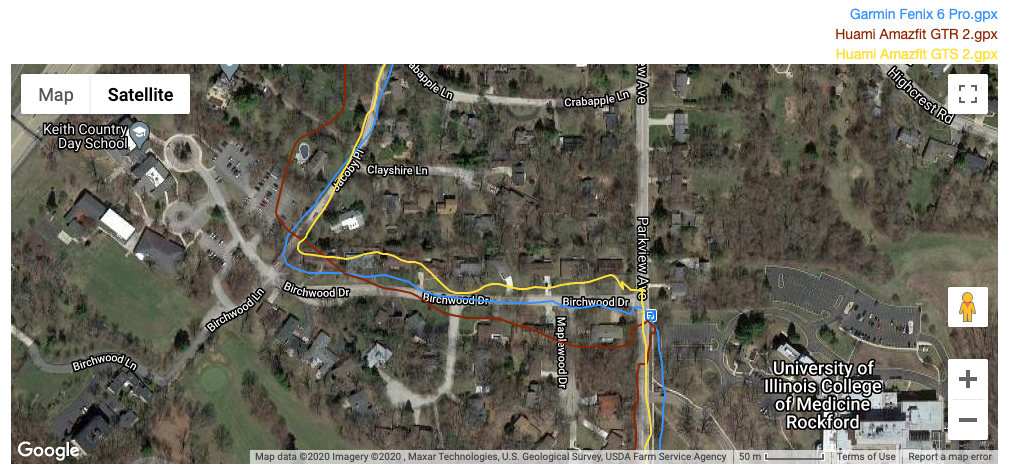
This was a challenging area for all three devices. I was running in a wooded part of a nearby neighborhood during this stretch. The Fenix 6 Pro stuck to the exact side of the street I was on, though as you can see, the GTS 2 and GTR 2 had other plans. The GTR 2 frequently freaked out and showed me running far into other parts of the neighborhood.
I expected this during this stretch, but the Amazfit devices even struggled in completely open parts of the route. See below.
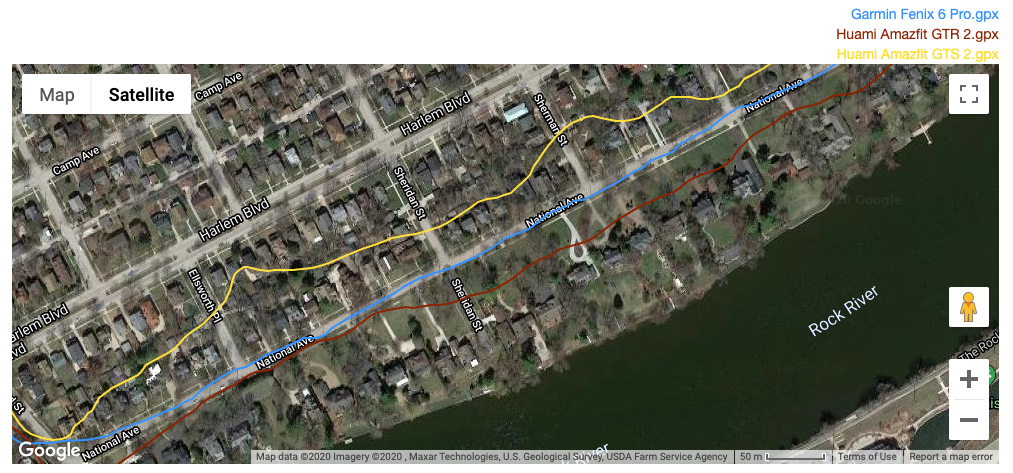
This stretch of the run was on an open, non-wooded area on a sunny day. It doesn’t get any easier than this. Though, the GTS 2 and GTR 2 were again all over the place. And yes, the GPS signal was locked on the entire run, so it shouldn’t be a connection issue.
Amazfit GTS 2 and GTR 2 review: Price and competition
The Amazfit GTS 2 and GTR 2 are now on sale on Amazon and Amazfit’s online store in the US and UK. The GTS 2 and GTR 2 sport edition cost $179.99/£159, while the GTR 2 classic edition is priced at $199.99.
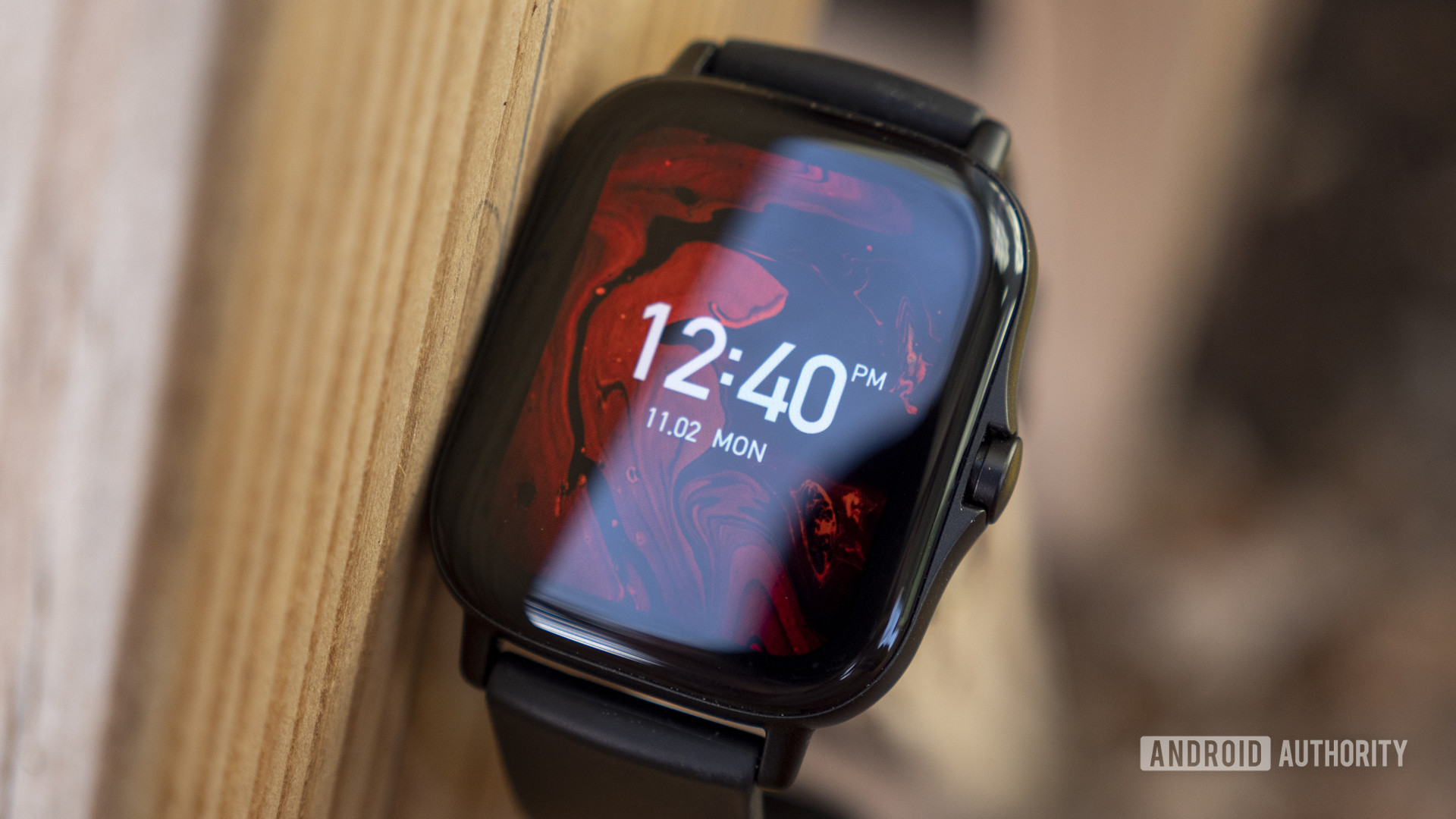
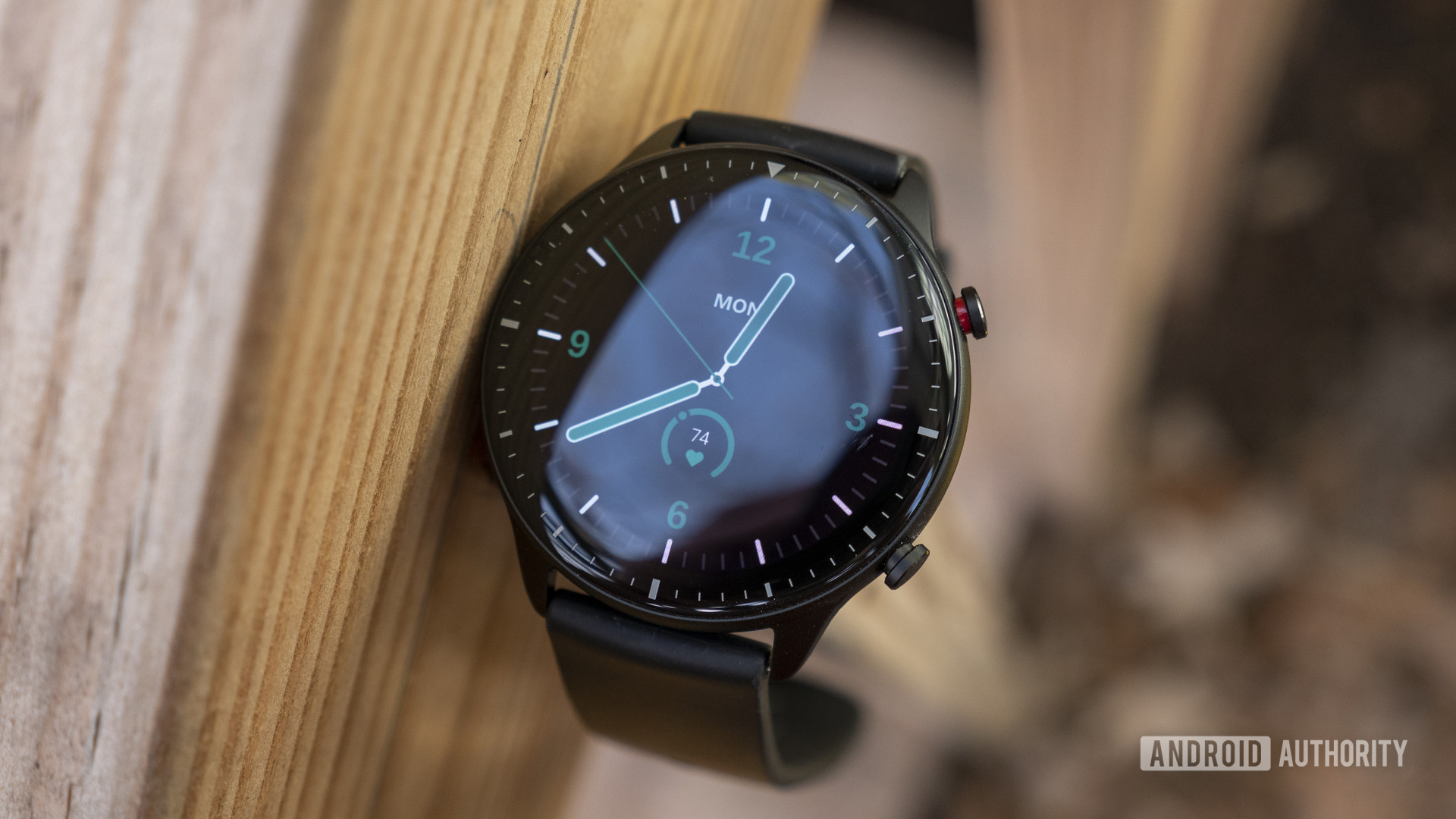
Huami faces stiff competition in this price range. The Garmin Venu Sq is perhaps the toughest competition in the US. It’s a fantastic GPS fitness watch and an all-around good smartwatch for $200 (currently on sale for $150). Increase your budget a bit more, and you’ll be in the realm of the $230 (on sale for $180) Fitbit Versa 3 and fantastic $279 Apple Watch SE. If your budget is already stretched, the Fitbit Charge 4 is a great value at $150 (on sale for $100).
Also read: The best smartwatch deals we could find
Amazfit GTS 2 and GTR 2 review: The verdict
Overall, the Amazfit GTS 2 and GTR 2 are fine devices, though I’m not sure if they’re worth the near-$200 asking price. They have plenty of fitness features, good hardware, and are available in many parts of the world. However, you can absolutely do better by spending a tiny bit more.
The Garmin Venu Sq is an all-around better buy, and Fitbit and Apple’s latest launches are solid, too. All three of those devices also have better companion apps and are much more accurate at tracking your fitness and health data.
Huami’s smartwatches are improving — that much is clear. Yet, there is a sea of great devices at the price point that frankly perform better and offer more robust features. That makes it tough to recommend the Amazfit GTS 2 and GTR 2.